Easy janchi guksu (Korean noodle soup) with anchovy broth, somyeon noodles, mung bean sprouts, chives, and fried tofu. A light, comforting Korean banquet noodle dish.
Janchi guksu is one of those simple Korean noodle soups that feels like comfort in a bowl—but I’ll admit, the traditional toppings never quite did it for me. The usual egg strips and a few veggies always felt a bit underwhelming.
That changed when I had a bowl of janchi guksu at a tiny restaurant in Korea’s eastern province. Their version came with seasoned mung bean sprouts, Asian chives, crispy tofu, and a heap of crushed sesame seeds floating on top of a deep, savory anchovy broth.


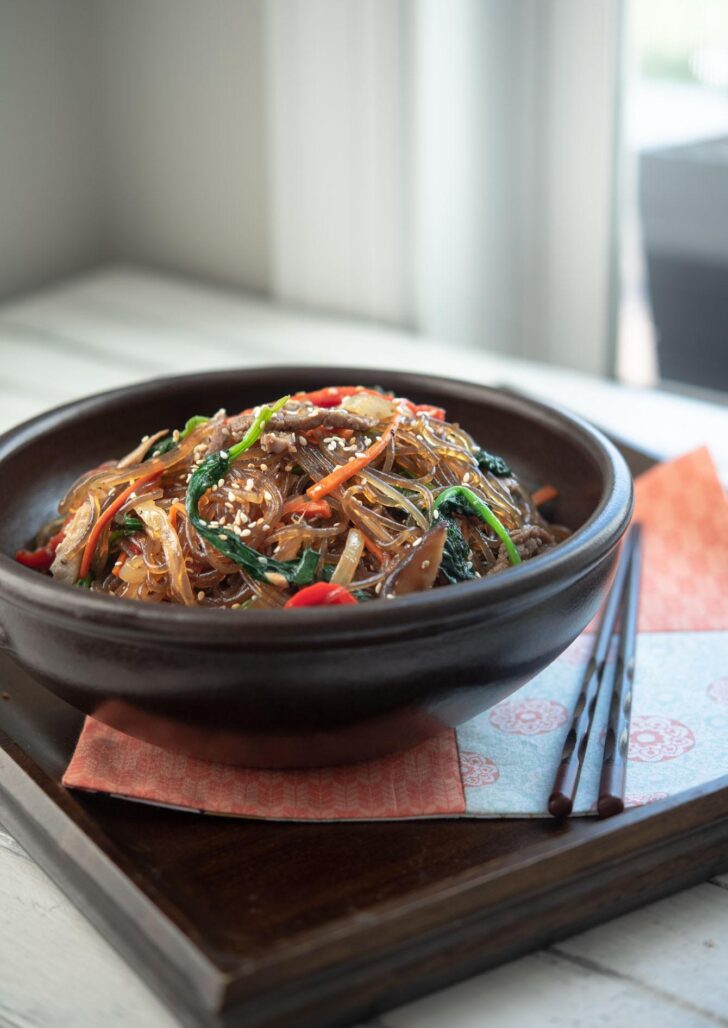

Get new recipes via email:
It was nothing fancy—but the flavor was unforgettable.
Ever since then, this has been my way of making janchi guksu. It’s still easy and light, but every bite has more texture, more umami, and more personality. I think you’ll love it as much as I do.
My Go-To Ingredients for Korean Janchi Guksu
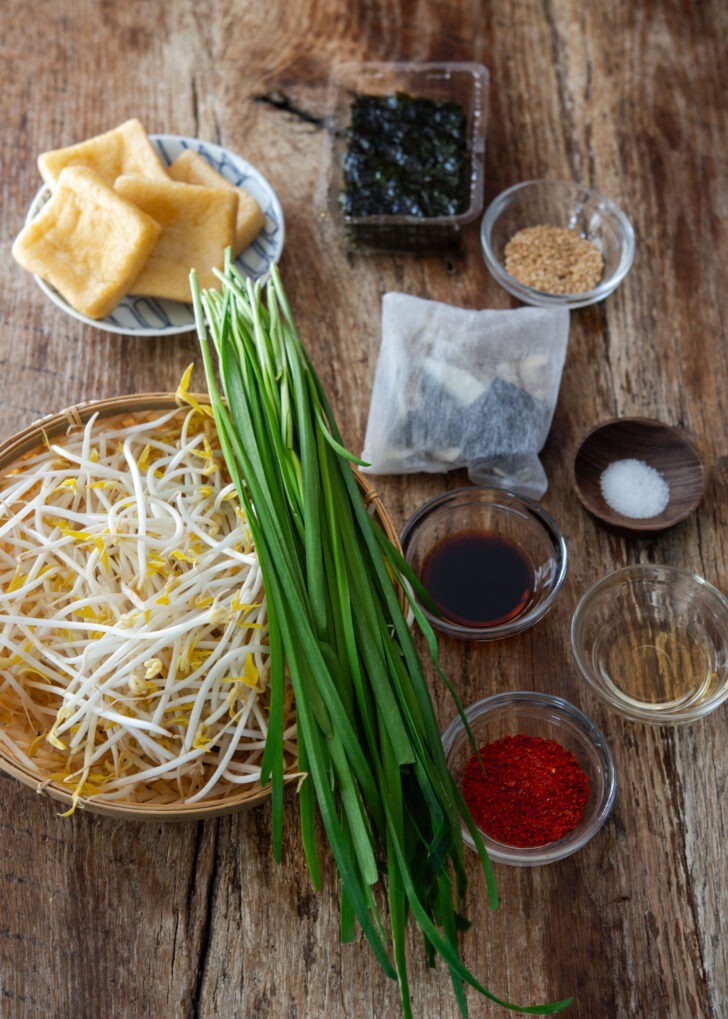



- Broth: The broth is everything in janchi guksu. I usually make mine with Korean soup stock packets when I need a quick prep. If you have time, anchovy-kelp broth made from dried anchovies (guts and heads removed) and a piece of kelp will give you the cleanest, most traditional base.
- Prefer something different? You can swap in beef, chicken, or vegetable broth. For a vegetarian version, dried shiitake mushrooms and kelp make a beautiful, umami-rich stock.
- Noodles: Janchi guksu is made with thin wheat noodles called somyeon. They cook fast and turn silky in the broth (I used this somyeon noodles in my kongguksu recipe as well). If you can’t find them, Japanese somen works just as well. Always rinse the noodles in cold water after boiling. It stops the cooking, removes extra starch, and keeps the texture springy.
- Toppings: My twist on janchi guksu includes blanched mung bean sprouts, Asian chives, and crispy fried tofu (yubu). The sprouts give a clean crunch, the chives bring freshness, and the tofu adds satisfying richness. I’ve also topped it with kimchi, thin egg strips, and even leftover bulgogi—this noodle soup is easy to make your own.
Making Janchi Guksu (Korean Warm Noodle Soup)
Please note that these pictures are meant to provide a helpful visual overview of the recipe. Full ingredient measurements and detailed instructions are located in the printable recipe card at the bottom of this post!




1. Make the broth
Simmer anchovy-kelp stock (or your preferred broth) and season with fish sauce and salt. Keep it warm until ready to serve.




2. Cook the noodles
I always splash in cold water during boiling to keep the texture just right, then rinse well to remove starch. This step makes a big difference in the final bowl.


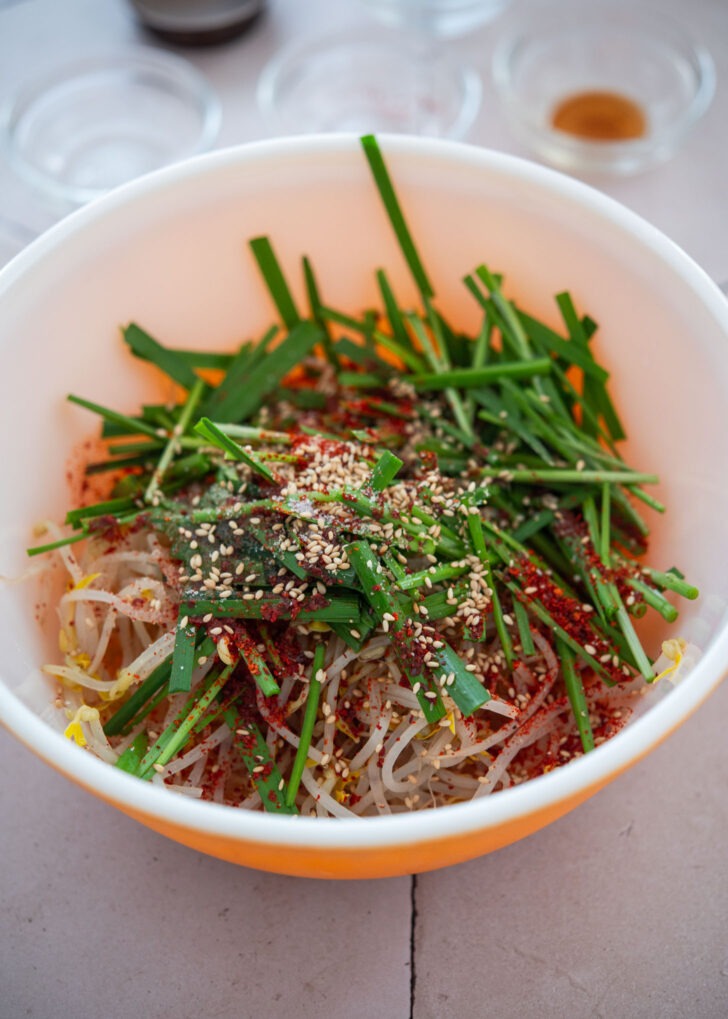

3. Prepare the toppings
While the noodles drain, season the mung bean sprouts and chives. A few fried tofu slices, some seaweed, and sesame seeds round things out.


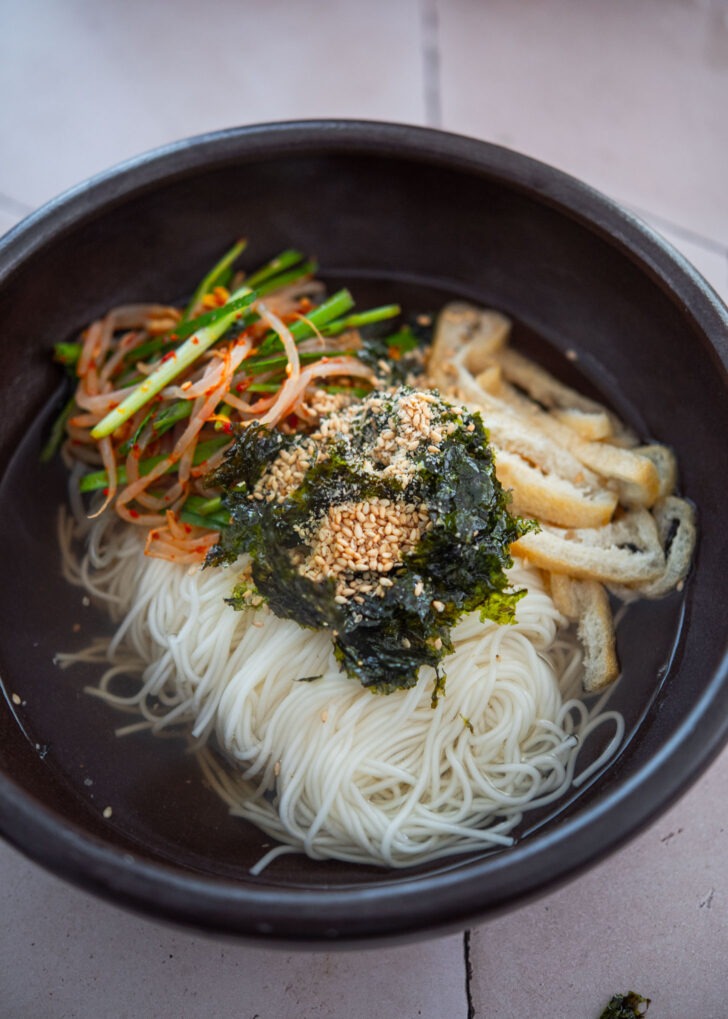

4. Assemble and serve
Everything gets layered simply—noodles first, then toppings, with hot broth poured around the sides. It’s fast, but it feels special every time.
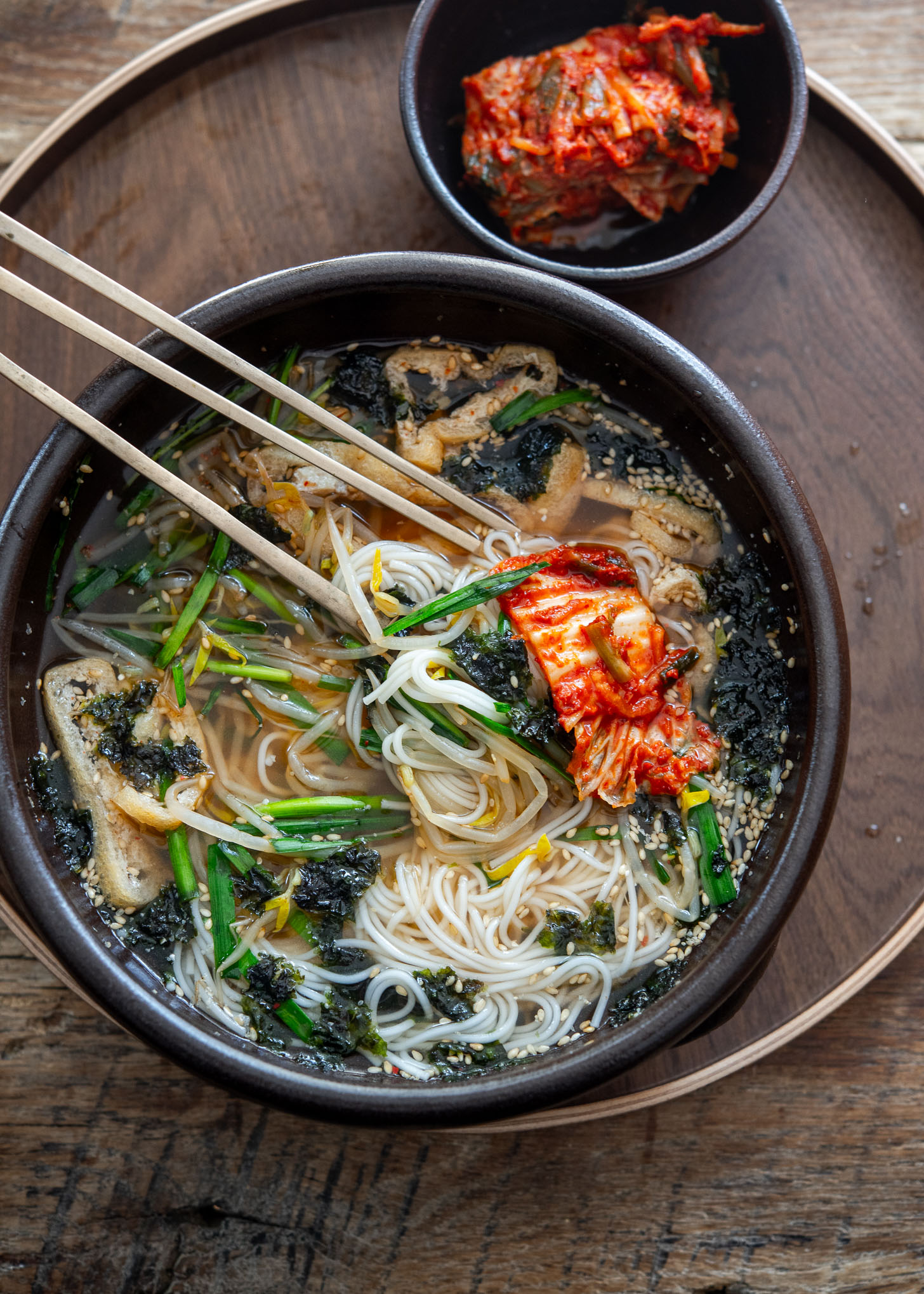

My Favorite Sides with This Korean Noodle Soup
Janchi guksu is often served with simple banchan (Korean side dishes) on the side. Here are a few great pairings:
Note: This noodle soup is light enough for lunch but also great as part of a larger celebratory meal. If you love this soup, you might also enjoy other dishes in my Korean noodle recipes collection.


Love this recipe? Rate it and share your experience in the comments below! On Instagram? Tag me to showcase your creation. For more delicious recipes, subscribe to our newsletter!
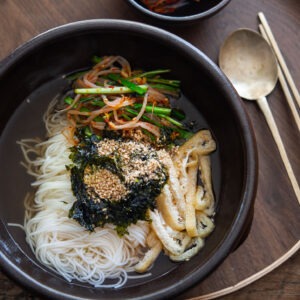

Janchi Guksu (Korean Banquet Noodle Soup)
Easy janchi guksu with anchovy broth, somyeon noodles, mung bean sprouts, chives, and fried tofu—a light, comforting noodle soup for any occasion.
- 8 oz (225 g) somyeon noodles
Broth (see note):
- 5 cups (1.2 liters) water
- 1 bag anchovy-kelp dashi packet, or 3 anchovy stock coins
- 1 tbsp (15 ml) Korean fish sauce
- pinches salt, to taste
Optional toppings
- 3-4 fried tofu (yubu), sliced
- 1 bag roasted seaweed snacks, crumbled
- 2 tbsp (6 g) toasted seaweed , crushed
- fried egg strips
- chopped kimchi
-
Make the broth: In a pot, combine 5 cups of water with a anchovy stock packet. Bring to a boil, then reduce heat and simmer for 10 minutes. Remove the packet. Season the broth with Korean fish sauce and salt to taste. Keep warm.
-
Cook the noodles Boil somyeon (thin Korean wheat noodles) in a large pot of water according to the package instructions. Add a splash of cold water once or twice during cooking to help the noodles stay chewy. When done, drain and rinse under cold running water to stop the cooking and remove excess starch. Set aside.
-
Prepare the mung bean sprout topping: Bring a small pot of water to a boil. Blanch mung bean sprouts for 5 seconds, then immediately rinse in cold water. Drain well. In a bowl, toss with chopped Asian chives, soy sauce, Korean fish sauce, Korean chili flakes (gochugaru), sugar, and a sprinkle of sesame seeds.
-
Prepare additional toppings: Cut fried tofu (yubu) into strips or bite-sized pieces. You can also prep thin egg strips (jidan), kimchi, or other toppings if desired. Set aside crumbled roasted seaweed and toasted sesame seeds for garnish.
-
Assemble and serve: Divide the cooked noodles into serving bowls. Arrange the mung bean sprout mixture and tofu on top. Add seaweed and sesame seeds. Gently ladle the hot broth around the noodles, just enough to immerse them. Serve immediately.
- For the most authentic flavor, use dried Korean anchovies (with heads and guts removed) to make the broth. They add deep umami without overpowering the soup.
- If you’re not a fan of anchovy stock, you can substitute with beef broth or chicken broth for a richer, heartier flavor.
- For a vegetarian option, use a light vegetable broth made with dried shiitake mushrooms and kelp (dashima). Keep in mind that each broth will bring its own unique taste to the dish.
Calories: 588kcal, Carbohydrates: 113g, Protein: 31g, Fat: 4g, Saturated Fat: 0.2g, Polyunsaturated Fat: 0.4g, Monounsaturated Fat: 0.2g, Sodium: 3630mg, Potassium: 369mg, Fiber: 12g, Sugar: 21g, Vitamin A: 2135IU, Vitamin C: 32mg, Calcium: 141mg, Iron: 4mg

